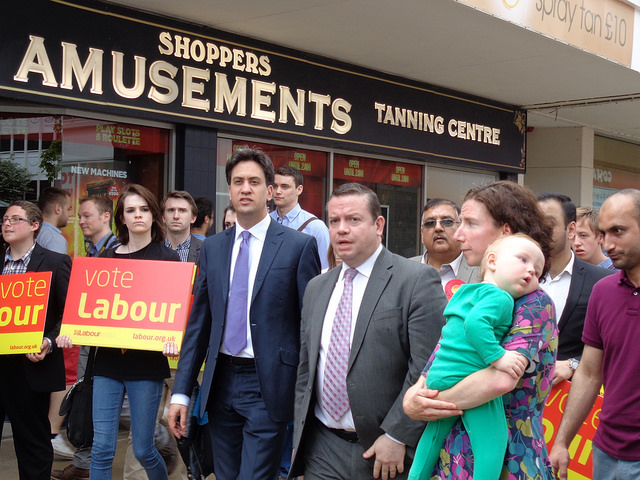Interview part 2: Tim Bale on Ed Miliband’s approach to public services, constitutional reform, and whether he can win
Labour could be on the cusp of returning to power after five years in opposition. Their success would represent a triumph which looked unthinkable back in 2010. Tim Bale has recently released a book detailing the Labour leader Ed Miliband’s quest to win in 2015. Here, Democratic Audit UK’s Sean Kippin interviews the author, asking him about public services, political and constitutional reform, and the election campaign.
To read part 1 of this interview click here.

Credit: Andrew Skudder, CC BY SA 2.0
Ed Miliband’s primary political interest seems to lie in political economy, and the relationship between the state and the market. Even when it comes to public services, he seems most happy when talking about private involvement in the NHS, for example. Do you think this lack of interest in other areas could hurt him at the election?
Well, leaders do always have their own interests, and they aren’t likely to be equally interested in every policy area across the piece. I would also say that public service reform, which occupied the previous Labour government, is a difficult area for an opposition Labour Party to get into. This is partly because – while its unfair to say that the party is at the beck and call of their “trade union paymasters” – upsetting the unions with talk of private involvement in public service isn’t something that a Labour opposition necessarily wants to do. Also, there is an extent to which Ed Miliband sought to define himself against New Labour. Since public service reform was New Labour’s “big thing”, particularly towards the end of their period in government, it is natural that he hasn’t made as much of it as he could have done.
Foreign affairs is possibly more interesting, because that really does seem to me to be, if not a big black hole in Labour’s offer to the electorate, then an area where relatively little has been said. Perhaps the one big exception to that is how Labour is going to play the referendum “game” on Europe, and there is a sense that the party has been preoccupied with that particular question at the expense of other foreign policy questions. I think there’s also an awkwardness on foreign affairs partly over what happened with Syria, [when Ed Miliband led the opposition to military involvement aimed at the Syrian regime], which was almost accidental but did risk offending the Americans, and that’s something that Labour has never particularly wanted to do.
I was wondering whether you had any thoughts on what we might expect in terms of political constitutional reform from a Miliband-led Government – is this an area of great activity?
Where you notice a lot of activity in the Labour Party has been work on more micro-level, process of government issues. There have been a lot of groups set up and a lot of work done to think about how Labour would run Number 10 Downing Street to better effect that either it did, or Cameron has done. As to the macro level, there’s been much less thinking about that. That was obvious I think when David Cameron did what he did the day after the Scottish Independence Referendum, when Labour was really woefully under-prepared for Cameron making that kind of manoeuvre [on English Votes for English Laws], even though one could have gamed the scenarios and perhaps predicated that he was going to do that.
When it comes to Scotland, I’m not sure that Labour have gone beyond thinking about Devo-Max when it comes to the kind of deal that the party are going to have to offer the SNP. When it comes to constitutional questions surrounding the House of Lords, I wouldn’t expect that that this potential Labour Government would be any better equipped to achieve democratisation of the upper chamber than its predecessors have been. Given the amount that’s going to be on its plate in other areas, I just can’t see it making that a priority.The only thing that might come up is possibility that electoral reform might come back onto the agenda. I think that’s a possibility that may occur, rather than something the party has thought seriously about.
Do you think that the more the public see of Ed Miliband in an ‘unfiltered’ environment during this election campaign, the more the public are warming to him, or at feeling less of an aversion to the notion of him being Prime Minister?
I don’t think Miliband has suddenly become popular overnight. It’s simply that he’s become less unpopular over a fortnight. That to some extent was inevitable, given that the expectations of him were so ridiculously low that he was almost bound to exceed them, as people begin to pay more attention.
He can’t completely overcome the focus group impressions of him as being somehow “odd” or having “usurped” his brother, or that he’s a “Hampstead liberal” – that in some way he’s not a normal guy. On the other hand he does retain a useful lead over David Cameron on something which seems to be important to people when they opposition leaders in particular, which is the notion of being ‘in touch’ with the needs of ordinary people. How much that has to do with Miliband himself, and how much that is to do with the brand of the Labour Party helping him is moot point, I think.
In terms of the election campaign, as we move towards polling day, he’s still got a few TV appearances to make, and if he doesn’t make any huge mistakes, and comes across as what he is – which is actually a personable, reasonably articulate, quick-thinking kind of guy who is rather more moderate than the “Red Ed” tag suggests – he probably is only going to gain or at least stand still, politically. The problem for him is that while there’s been quite a lot of press interest in the fact that his numbers have improved, actually David Cameron’s have as well. In fact, Cameron’s are now into positive territory, while Miliband’s are still negative, albiet less negative than they were.
Then of course one gets into this whole question of how much difference leaders actually make to voting intention. My opinion is that they do, but only probably only at the margins. I don’t think Miliband, like some Conservatives think, can lose the election for Labour if it’s one that Labour are in contention to win.
—
This is part two of a three part interview. Part one can be found here, and part three will be posted next week.
Note: this post represents the views of the author, and not those of Democratic Audit or the LSE. Please read our comments policy before posting.
—
 Tim Bale is Professor of Politics at Queen Mary’s University, and a Trustee of Democratic Audit UK.
Tim Bale is Professor of Politics at Queen Mary’s University, and a Trustee of Democratic Audit UK.





 Democratic Audit's core funding is provided by the Joseph Rowntree Charitable Trust. Additional funding is provided by the London School of Economics.
Democratic Audit's core funding is provided by the Joseph Rowntree Charitable Trust. Additional funding is provided by the London School of Economics.
… [Trackback]
[…] Read More: democraticaudit.com/?p=12450 […]
Second part (transcript) of a long chat re Ed Miliband & Labour’s Five Year Mission with @democraticaudit’s @se_kip https://t.co/lqvl7ifGAH
Interview part 2: Tim Bale on Ed Miliband’s approach to public services, constitutional reform and whether he can win https://t.co/JoK8XeOoD2
Interview part 2: Tim Bale on Ed Miliband’s approach to public services, constitutional reform, & whether he can win https://t.co/IV7CzkF6Wt
Interview part 2: Tim Bale on Ed Miliband’s approach to public services, constitutional reform, and whether he can w… https://t.co/csvBjix9SG
What does @proftimbale – author of a new book about @Ed_Miliband’s @UKLabour leadership, think about his chances? https://t.co/2pDeBVztQg
Interview part 2: Tim Bale on Ed Miliband’s approach to public services, constitutional reform, and whether he… https://t.co/0lVX9bxb6g